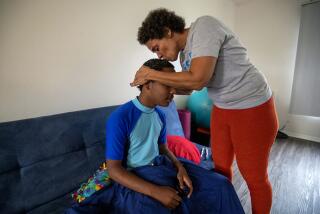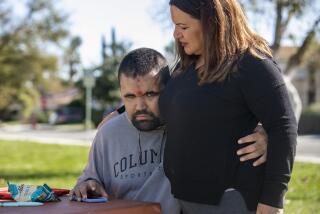‘90s FAMILY : Parents Should Just Say ‘No’ Too
- Share via
Her 15-year-old son is in a group home and the Los Angeles homemaker, a former teacher, has been told it is not her fault, nor that of her husband, an executive.
“It’s his choice to misbehave,” she said. “That’s what my head is told. But it’s not down in my heart yet.
“In my heart, I say, ‘If only I’d done something different. Said “no” when I said “yes.” Set the limits I didn’t set, he wouldn’t be in the situation he’s in.”’
Children are relentless in their demands for attention, for toys, for clothes, for amusement.
According to psychologist Ron Taffel, author of “Parenting By Heart” (Addison-Wesley, 1993), parents who say “yes” too often are sometimes striving for impossible states of perfection, are intimidated by their own children or fear disappointing them. Fathers as well as mothers are afraid their bond with their children isn’t strong enough to withstand a firm “no.”
Not only will children love their parents after being told “no,” it is crucial to their developmental health. Therapists are well aware that children who haven’t learned to take “no” for an answer not only cause widespread misery for others, but also tend in later life to seek out partners they can push around.
The Los Angeles parents described their son as more demanding and willful than most from the start. As a baby, he would negotiate for three cookies if he got two, and win.
His mother said there were so many things she wanted to do for him. There were the planned outings to Disneyland or the Children’s Museum that should have been canceled because of bad behavior, but weren’t. She sometimes did his homework for him. She dipped into her savings to buy him a $450 bike that was loaned out to friends and eventually disappeared.
He became a tyrant, upping his demands. One Christmas she asked him to list his desires. They totaled nearly $6,000. He would react angrily if thwarted.
By junior high, the parents had lost all control. By high school, they cracked down, demanding that he sign a contract acknowledging that they expected him to go to school, earn passing grades, be in by 10 p.m. and not take drugs.
He ran away from home, starting the chain of events that led him to the group home.
It’s not easy, but even parents of troubled teen-agers can learn to just say no, said Beverly Hills counselor Diane Vanette. Their first task is to establish mutual respect. It can be done by offering clear and simple choices. “I can’t buy that pair of shoes, but let’s work out a deal. You work and earn so much money and I will put aside so much money.”
Taffel said parents must make the effort to stand up for their own needs, asking if their children have been cooperative enough to deserve special favors. In between demands and negotiations, parents can also expect some empathy (from school-age or older children) for their feelings.
Through more therapy than they expected they’d undergo, the Los Angeles parents have learned to present a unified front, to keep their emotions in check and to postpone decisions. Said the mother, “This is something I never knew you could say: ‘I’ll get back to you on that when we’ve talked it over.”’
They have established rules and consequences. When their son earns a weekend pass to come home but doesn’t follow the house rules, they have driven him back immediately.
The boy said he likes it better this way. He wants to come home.
But the mother is anxious. If that happens, she said, “I can’t take him back to the group home when he misbehaves. We have to have something equally as awful that he wouldn’t want to have happen so he wouldn’t do these things.”
She does not want to feel like a failure. “You almost don’t want to care so much,” she said. “But you do.”
More to Read
Sign up for Essential California
The most important California stories and recommendations in your inbox every morning.
You may occasionally receive promotional content from the Los Angeles Times.










